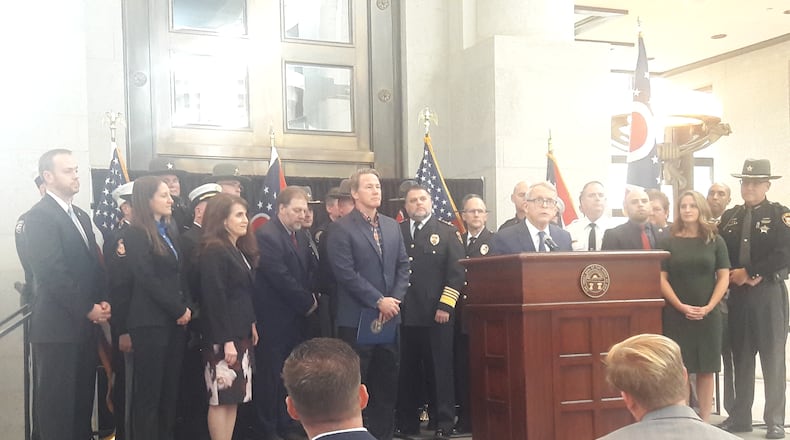A “significant amount” would go toward reducing the backlog in ballistic testing, crime labs and coroner’s offices, helping to speed up the identification of criminals, he said.
DeWine said he and Attorney General Dave Yost would soon make more announcements on state-level initiatives to cut investigative backlogs.
The additional $75 million would fund “resilience, recovery and recruitment” programs to help first responders deal with trauma, provide support services and assist future officers in paying for education and training, DeWine said.
DeWine said the grants will be competitive, and the state Office of Criminal Justice Services will set standards for grant amounts and eligibility. DeWine said he told OCJS that he wants a simple process because he is in a “pretty big hurry” to disburse the money as soon as possible.
Lt. Gov. John Husted said some grants are expected to invest in technology to combat the growing threat of cyberattacks, protecting critical infrastructure and countering misinformation.
Asked whether some of the money could be used to help cover the Ohio Police & Firefighter Pension Fund’s $6.5 billion long-term deficit, DeWine said he’s open to discussions on how to cover that shortfall but “this money is different.”
Husted said the federal stimulus money can’t be used for the pension fund.
The money, all federal dollars from the American Rescue Plan Act of 2021, would be allocated through legislation: Substitute House Bill 169.
The original House Bill 169, sponsored by Reps. Al Cutrona, R-Canfield, and D.J. Swearingen, R-Huron, would have given $135 million in grants to hotels, bars and restaurants to offset their loss of business due to COVID-19. Introduced in March, it passed the House 91-0 in April and was referred to the Senate Finance Committee, where it has had three hearings.
Swearingen said Monday that the substitute bill would add the $250 million for first responders to the hospitality industry funding already proposed.
DeWine said he developed the proposal in collaboration with legislators from both houses.
The American Rescue Plan, which President Joe Biden signed March 11, is a $1.9 trillion package aiming to help the country recover from the economic and health effects of COVID-19. Ohio state government received about $5.7 billion directly from ARPA, with another $5.3 billion going to local governments statewide.
Backed by a crowd of first responders from agencies statewide, DeWine made the announcement in the Ohio Statehouse Atrium on Monday afternoon.
“There have been calls for defunding the police, which can leave officers demoralized,” he said. Some police have quit and departments have trouble finding qualified replacements, DeWine said.
“This is not the time to defund the police,” he said. “This is time to fund the police and to fund them in a new and creative way that helps them protect us against the violent offenders.”
Though Columbus officials briefly considered cutting city police funding early this year, no proposal to substantially defund police agencies in Ohio has been enacted.
In June 2020, DeWine endorsed a number of police reforms, including a ban on chokeholds in all but life-or-death circumstances, requiring professional licensing for police officers, and requiring body cameras for all officers statewide.
Late last month he announced that all Ohio State Highway Patrol officers on the road will be wearing body cameras by May 2022.
But legislation on other reforms has stalled. DeWine said Monday he still supports policing changes, saying there is “really no reason not to move forward.”
About the Author

